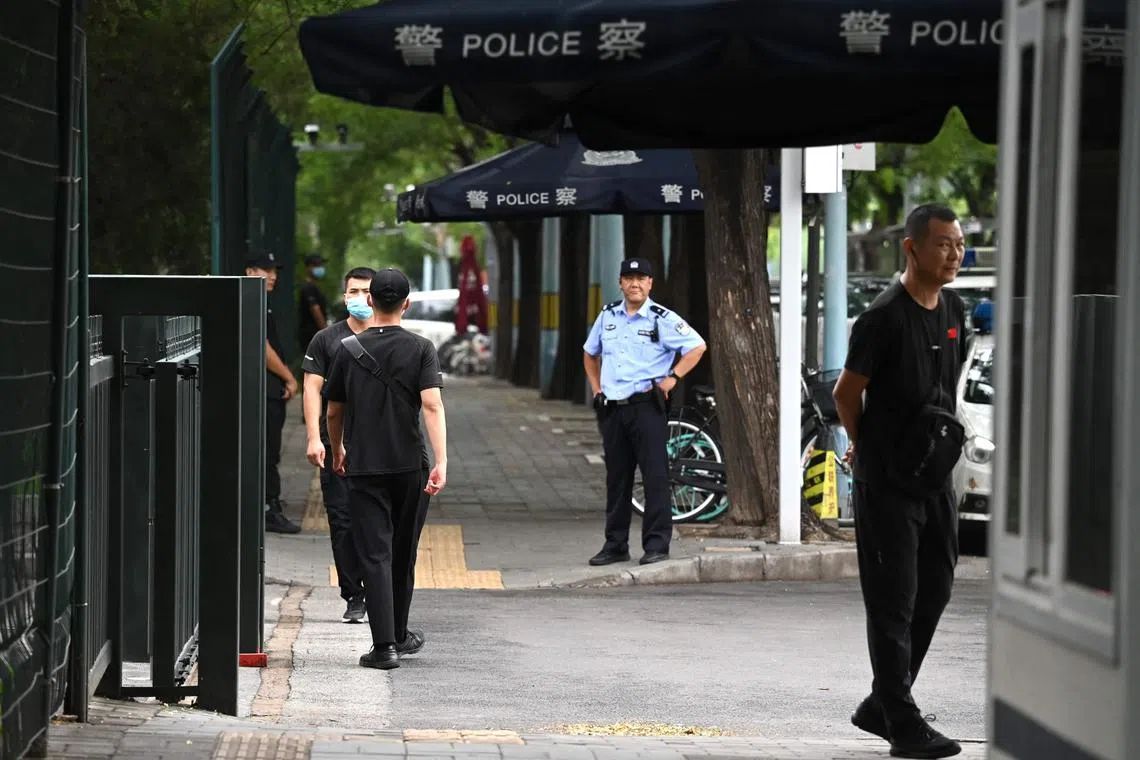Brick thrown at Japan embassy in China in Fukushima water spat
Sign up now: Get insights on Asia's fast-moving developments

Police and security personnel guarding the entrance of the Japanese Embassy in Beijing on Aug 26.
PHOTO: AFP
Follow topic:
TOKYO – Tokyo demanded on Tuesday that China ensure the safety of Japanese citizens as it reported a brick being thrown at its embassy in Beijing in an escalating row over the release of Fukushima treated water.
Last week, China banned all seafood imports from its neighbour
Since then, Japan has urged its citizens in China to keep a low profile
Japanese Foreign Minister Yoshimasa Hayashi on Tuesday confirmed media reports that a brick was thrown at its embassy in Beijing and echoed calls from Prime Minister Fumio Kishida to China on Monday to take action to calm the situation.
“We would like to urge the Chinese government again to take appropriate measures immediately, such as calling on its citizens to act calmly, to prevent the situation from escalating and to take all possible measures to ensure the safety of Japanese residents and our diplomatic missions in China,” he said.
He added that China should “provide accurate information” about the Fukushima water release “rather than unnecessarily raising people’s concerns by providing information without any scientific basis”.
In Beijing, a spokesman for the Japanese Embassy said that employees were “extremely worried”.
“Some individuals have come to our (embassy) entrance... then were led away by armed police,” the spokesman said.
In response, Foreign Ministry spokesman Wang Wenbin said on Tuesday that Beijing “protects the safety” of foreigners in China, dismissing the “so-called concerns of the Japanese side”.
“Ignoring the strong doubts and opposition of the international community, the Japanese government unilaterally and forcibly started the discharge of contaminated water from the Fukushima nuclear accident, which aroused strong indignation among people of all countries,” he added.
“This is the root cause of the current situation.”
Analysts say that China’s sharp criticism of the Fukushima release is partly motivated by its geopolitical and economic rivalry with Japan.
On Sunday, Japan’s Foreign Ministry urged its citizens in China to be “cautious” in their speech and behaviour.
“Do not speak Japanese unnecessarily or too loudly,” it said.
Eggs and stones have also reportedly been thrown at Japanese schools in China.
Japanese residents in China vented their fears on messaging platform X, formerly known as Twitter.
“I’m a bit scared... We have to worry about our own children being harmed by something we can’t control. I don’t know what to think,” tweeted Miki, a Japanese woman living in Shanghai, according to her profile.
Various businesses in Japan, from bakeries to an aquarium, have reportedly been subjected to thousands of crank calls
Social media users in China have posted recordings and videos of the calls, some of which have attracted tens of thousands of likes.
Japan began releasing more than 500 Olympic-sized swimming pools’ worth of diluted wastewater from Fukushima into the Pacific Ocean last Thursday, 12 years after a tsunami knocked out three reactors in one of the world’s worst atomic accidents.
All radioactive elements have been filtered out except for tritium, levels of which are within safe limits and below that released by nuclear power stations in their normal operations – including in China, plant operator Tokyo Electric Power Company says.
Test results from seawater and fish samples near the plant since the start of the discharge – which will take decades to complete – have confirmed this, according to the Japanese authorities. AFP

